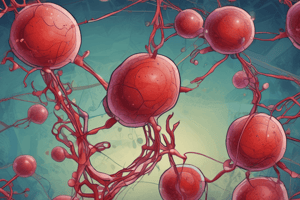Podcast
Questions and Answers
What is the primary effect of sickle cell disease on hemoglobin?
What is the primary effect of sickle cell disease on hemoglobin?
- Reduced oxygen-carrying capacity
- Increased oxidative stress
- Defect in globin chains
- Abnormal shape of hemoglobin (correct)
What is the main consequence of thalassemias on red blood cells?
What is the main consequence of thalassemias on red blood cells?
- Anemia
- Oxidative stress
- Hemolysis (correct)
- Sickling
Which of the following triggers glucose-6-phosphate dehydrogenase deficiency?
Which of the following triggers glucose-6-phosphate dehydrogenase deficiency?
- Hemolytic anemia
- Genetic mutations
- Low oxygen levels
- Infections and certain foods (correct)
What is the main effect of glucose-6-phosphate dehydrogenase deficiency on erythrocytes?
What is the main effect of glucose-6-phosphate dehydrogenase deficiency on erythrocytes?
What do sickle cell disease and thalassemias have in common?
What do sickle cell disease and thalassemias have in common?
What is the primary function of the endocrine system?
What is the primary function of the endocrine system?
How do hormones interact with their target organs?
How do hormones interact with their target organs?
What is the primary mechanism for regulating hormone levels?
What is the primary mechanism for regulating hormone levels?
Which two brain regions are key to regulating hormone levels?
Which two brain regions are key to regulating hormone levels?
What is the primary function of endocrine glands?
What is the primary function of endocrine glands?
Flashcards are hidden until you start studying
Study Notes
Genetic Disorders Affecting Hemoglobin
- Sickle cell disease is a genetic disorder caused by a genetic change in beta-globin, leading to sickling, especially when oxygen levels are low.
- Thalassemias are genetic disorders that cause defects in globin chains, resulting in hemolytic anemia.
- Thalassemias affect the production of hemoglobin, leading to anemia and other complications.
Glucose-6-Phosphate Dehydrogenase Deficiency
- Glucose-6-phosphate dehydrogenase deficiency is a genetic disorder that limits the ability of erythrocytes to protect against oxidative stress.
- This deficiency leads to hemolysis, triggered by specific factors such as infections, severe stress, certain foods (e.g., fava beans), or certain medicines (e.g., antimalarial drugs).
The Endocrine System
- The endocrine system is a vital communication system that relies on hormones to transmit information.
- Hormones are produced by endocrine glands and then transported through the bloodstream to reach their target organs.
Hormone Regulation
- Hormone levels are controlled through a process called negative feedback inhibition.
- The hypothalamus and pituitary gland interact to regulate many key hormones, ensuring a delicate balance in the body.
Studying That Suits You
Use AI to generate personalized quizzes and flashcards to suit your learning preferences.




